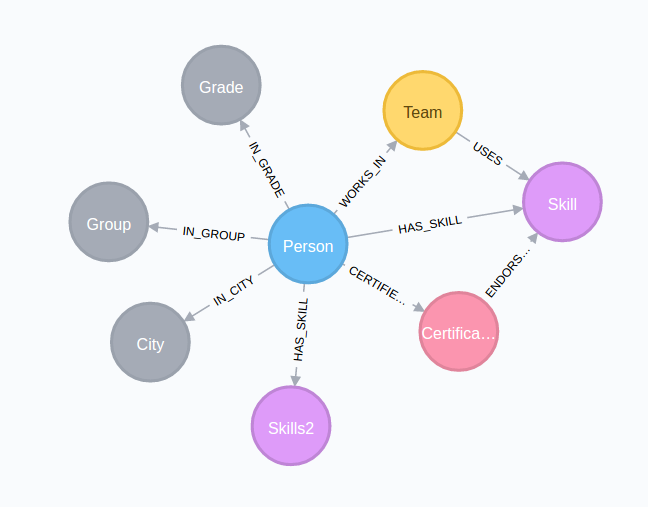Introduction
As part of ongoing efforts towards learning (Sharpen the Saw!), I have been playing around with Graph Databases and Machine Learning in the context of HR / People development.
In case of Graph Databases, I picked Neo4J to do some experiments - partly because it is quite easy to setup, is free etc.
Sources / types of data include:
- People records (Joining, Total Expr, Promotions, Titles, City)
- Skill data (raw skills information, grouping, certifications, social endorsements)
- Team data (name, members, skills required in general)
- Performance data - ratings, feedback, coding behaviours
- Internal Knowledge management / Expert Forums - to seek out skills
Rough Schema
Here is roughly how the relationship are setup - for lack of a Schema.

The Interesting part:
Obviously, I am doing this for the insights. Here are a some interesting questions I was able to answer:
- Find all Junior managers managing teams remotely - they may need support to be successful
- If a Person knows “X” Technology, what are technologies are they likely to knows
- Which people know “X” technology, but are part of teams that don’t require that skill? Sub-optimal use
- Find employees “similar” to a given person - This helps in mitigating key-person risk, succession planning
- Find the “Best Fit” team for a given person
- Given open-positions in the organization, who can be tapped internally? Job mobility.
- What are some pre-requisites for a Certification?
- If I want to work in Team X or for a particular function (say: business analysis), what certifications are useful?
Is this really easy to implement?
If I can whip up some code to quickly answer these questions, why is it that larger organiztions are not using such approaches already?
Answer is simple - This is not a technology problem. Getting quality data requires connecting disparate systems that hold useful information. And for the most part, they are unreliable and “point-in-time”.
Sometimes, it is possible to infer information - For example: what skills are expected in a particular team? We could get this from the team management or infer from the most common skills in the team.
Some ideas for implementation
- Using internal and external social platforms to capture and validate skills and endorsements
- Gamification to collect and cleanse data
- Make these insights part and parcel of day to day team and individual activities, feedback sessions, internal mobility, hiring, learning etc.
